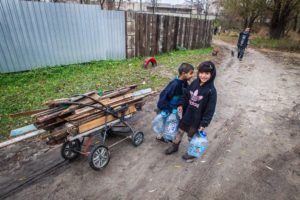Roma children in France: poor children in a rich country
Arriving from Eastern Europe, particularly from Romania and Bulgaria, there are almost 15,000 Roma children in France living principally in slums outside cities. Living on the margins of society, the Roma, and especially their children, encounter major difficulties assimilating and gaining access to the educational system.
The situation of Roma children: deplorable sanitary conditions
 Roma are unpopular everywhere in France. Accused of many social ills such as theft and begging, the Roma community nevertheless remains friendly and welcoming, and children breathe the joy of life.
Roma are unpopular everywhere in France. Accused of many social ills such as theft and begging, the Roma community nevertheless remains friendly and welcoming, and children breathe the joy of life.
However, behind their smiles lies undeniable misery. They live in extremely precarious conditions and sometimes in hiding. They live their daily lives in caravans parked in fields. Next to these “houses,” electricity lines are bathed in mud, or even in pools of water.
The right to education often trampled
Often barefoot and dressed in salvaged clothes, the children sometimes have trouble integrating into French society. Access to education for the youngsters is sometimes a true ordeal because of the financial and administrative difficulties parents–themselves subject to discrimination–are confronted with. Thus, each year families are denied the right to educate their children under various pretexts, such as the inability to provide proof of domicile. Yet, the right to education is a fundamental right, recalled in Article 28 of the International Convention on the Rights of the Child, which states the following:
« 1. State Parties recognize the right of the child to education, and with a view to achieving this right progressively and on the basis of equal opportunity, they shall, in particular:
a) Make primary education compulsory and available free to all;
b) Encourage the development of different forms of secondary education, including general and vocational education, make them available and accessible to every child, and take appropriate measures such as the introduction of free education and offering financial assistance in case of need; (…) »
Furthermore, article 131-1 of French Code of Education states that:
“Education is obligatory for children of both genders, French and foreign, between six and sixteen years old. (…)”
Fortunately, thanks to the engagement and help of committees and associations, the enrolment rate for children in Roma communities is steadily rising. At Saint-Ouen, in the Paris region, some 45 children learn their lessons in “school trucks,” in which teachers hold classes twice a week.
Active engagement of the civil society
Many stakeholders: associations, groups of people, students, do tremendous work by  helping each individual navigate administrative, legal, and jurisdictional processes, as well as offering them training or tutoring for the youngsters. The associations also help families find decent housing in order to provide greater social stability for the children. Indeed, the Roma camps are often illegal, and a certain number of prefectures have chosen to order the evacuation of these camps despite the inter-ministerial memorandum of August 26, 2012 on anticipating and accompanying evacuation operations of illegal camps. This memorandum encourages competent authorities to take certain measures in order to promote social stabilization of the Roma community.
helping each individual navigate administrative, legal, and jurisdictional processes, as well as offering them training or tutoring for the youngsters. The associations also help families find decent housing in order to provide greater social stability for the children. Indeed, the Roma camps are often illegal, and a certain number of prefectures have chosen to order the evacuation of these camps despite the inter-ministerial memorandum of August 26, 2012 on anticipating and accompanying evacuation operations of illegal camps. This memorandum encourages competent authorities to take certain measures in order to promote social stabilization of the Roma community.
Even if since, January 1, 2014, Romanians and Bulgarians—the majority nationalities in Roma communities–have has the right to “live and work in the same conditions as other EU citizens,”,they nevertheless remain victims of discrimination in hiring. However, recent developments give us hope for a better future for Roma children in the coming years.
Saint-Ouen-l’Aumône : le tribunal saisi pour la scolarisation d’un enfant Rom, leparisien.fr, date of publication: October 21, 2015, open access.
FLORIANE LOUISON, Saint-Ouen : les enfants roms apprennent l’école dans un camion, leparisien.fr, date of publication: 25 mai 2016, Date de mise à jour : 20 août 2016, open access.
Campements illicites : un cadre d’action pour les services d’Etat, http://www.vie-publique.fr/, Date of publication: September 7, 2012, open access.
L’accès au travail salarié, http://www.droitsdesroms.org/, consult date: August 20, 2016, open access.
DIDIER DUBASQUE, les “roms” pourront-ils vraiment travailler légalement en France? (sans tracasseries administratives), Mediapart, date of publication: January 6, 2014, consult date: August 19, 2016, open access.
| Written by: Myriam Allory Translated by: Ann Green Proofread by: Diane BE Proofread by: Catherine Nicol and Emilie P. |

